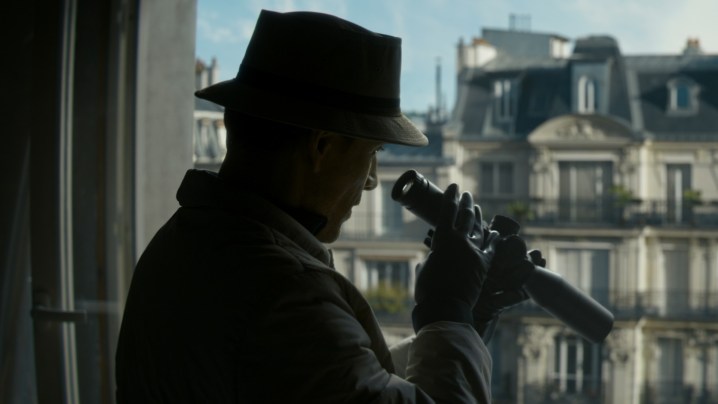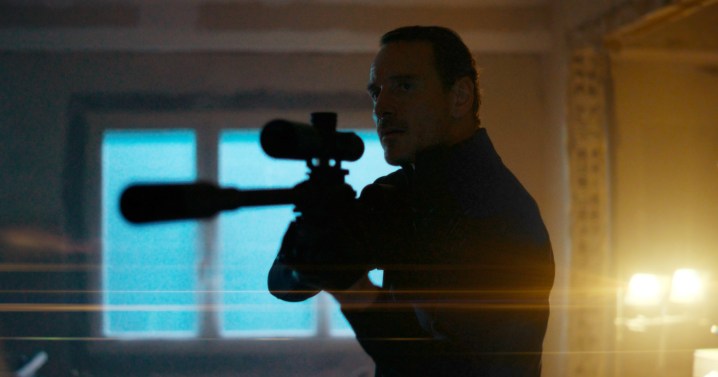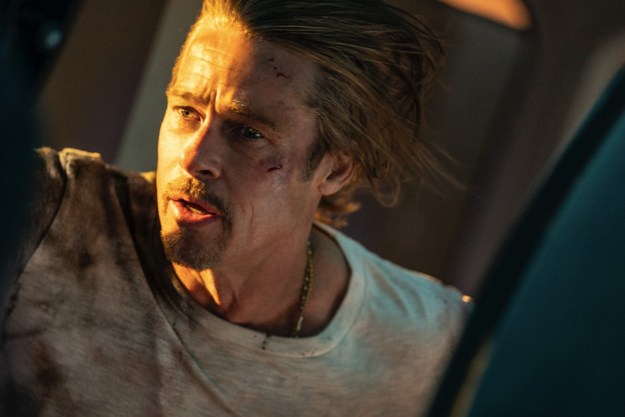
“What makes The Killer more than an exercise in businesslike genre cool is the powder-dry humor sprinkled over its immaculate surface.”
- It's typically stylish
- It's atypically funny
- It's as personal as David Fincher gets
- The ending is anticlimactic
- It's a big-screen movie destined to be streamed
When Jimmy Stewart raised a camera to his eye and aimed it at the apartment building across the way in Rear Window, he looked less like himself and more like his director — Hollywood’s ultimate leering, obsessive voyeur, Alfred Hitchcock. Something similar happens in The Killer, David Fincher‘s expectedly slick, unexpectedly funny new thriller. It’s a scope that Michael Fassbender peers through in this movie, and a shot of a different sort that he lines up through the rear window of his Parisian crow’s nest. All the same, the impression of a self-portrait painted over a movie star is hard to miss. Fincher’s silhouette may be less iconic than Hitchcock’s, but if you’ve followed the career of the man who made Zodiac, Seven, and The Girl With the Dragon Tattoo, you’ll recognize all the lines it sketches around his latest dealer of death.
The character is an assassin, a man with no name, a man of few words. We meet him on assignment, staking out the secure apartment of his wealthy target from a rented office space — it’s a little vignette of wait-and-hurry-up that functions as the film’s introductory chapter and allows us to gaze into the methods of a WeWork wetworker. The Killer is a consummate professional: precise in his craft, comfortable with boredom. “My process is purely logistical, narrowly focused by design,” he narrates. He has a job and he strives to do it well. He is a perfectionist — the best word for a hitman slowing his heart rate for the sake of marksmanship, but also for a filmmaker prone to requesting upwards of 50 takes to get the exact mannerism he’s seeking from an actor.

Fassbender’s Killer belongs to a proud movie lineage, a tradition of existentially freighted and laconic men of action. He doesn’t talk much. Not audibly anyway. Inside his head, he’s a total chatterbox. The Killer reunites Fincher with Andrew Kevin Walker, who wrote Seven and punched up Fight Club and The Game. Here, he’s supplied a veritable novella of voice-over that might make Tyler Durden plead for a little quiet. It takes a moment to realize this coolly cynical inner monologue (“It’s a dog-eat-dog world”) might be intentionally rather than accidentally self-parodic. After a career of following mindhunters, Fincher has finally gotten into the mind of a killer and finds it resembles a dorm room plastered with posters of his movies.
He remains a wonk for process, even or perhaps especially when that process is tedious. In a David Fincher movie, people are always going and doing. The Killer is indiscriminate in its fascination with activity. It applies no more studious attention to Fassbender fleeing a crime scene — his motorcycle darting around tight corners, expertly escaping the perimeter set up by the authorities — than it does to him rifling through laminated documents or a Rolodex, trading out license plates, or placing a glass on a hotel doorknob to clue him to an ambush. This Killer is a gig-economy gunman, and it’s oddly amusing to see the kind of surface appreciation the James Bond movies reserve for the finer things lavished on commercial spaces: car rental desks, economy cabins, fast food restaurants that supply our antihero with a quick morning calorie fuel-up before his next kill.

Fassbender offers an ideal vessel for pared-down thrills. Like Steve McQueen or Alain Delon or Ryan Gosling, he looks sharp and cool, an iconic logo of a protagonist. His performance gives us nothing, but keeps us looking for something. The explicit emotion in the movie belongs only to the supporting characters unfortunate enough to slip into his crosshairs. There’s a great, queasy sequence involving someone in the wrong place at the wrong time who’s smart enough to know how little mercy they’re in a position to expect. The movie gravitates to this side perspective almost by default, as an alternative to a main character so methodical he literally slows his own pulse. Later, the movie stops for a last supper in a swanky restaurant and a feast of a star cameo as it plays out a futile one-sided conversation with a black void.
“Empathy is weakness, weakness is vulnerability,” The Killer tells himself. But is he really so free of feeling? Like the driver of Drive, the man seems to express himself in song selection — the Smiths tracks he pipes into his ears while doing his dirty job. The Pope of Mope is a funny choice for a guy proud of his supposed blankness. If it’s an emotional tell, Fincher undercuts any romantic stirrings of soul: The guy who tore down Manhattan to another revered ’80s rock group resists his music-video roots, never going for easy needle-drop catharsis. When The Killer cues up his soundtrack while steadying his aim, Fincher cuts in and out of his headphoned headspace, deliberately wrecking the rhythm.

The plot, adapted from a French graphic novel, is all sinew. A job goes wrong, consequences ensue, and several new, related jobs take its place. Fincher creeps the action across the globe step by step, from assignment to assignment, with the dispassionate flow of a balance transfer. How can something be so efficient and so neurotically detail-oriented? You might call it a perfect alignment of artist and material if Zodiac, Fincher’s masterpiece of file cabinet compulsion, didn’t achieve that already through its dense procedural legwork.
What makes The Killer more than an exercise in businesslike genre cool — though it is that, too, and quite hypnotically — is the powder-dry humor sprinkled over its immaculate surface. For all his devotion to protocol, for all his obsession with code, The Killer is far from infallible. The movie’s dark joke is on the way the plan always can and often will go awry: with a missed shot, with bad math, with a brutal full-contact fight that dashes his hopes of an in-and-out hit. Even his mantra — a kind of self-discipline pep talk — gets interrupted at one point, in what could be described as voice-over slapstick. Being obsessed with control doesn’t mean you’ll actually achieve it. There are too many variables.
The ending is anticlimatic, almost perversely. It begs for a capitalistic reading, not a dramatic one. You could see Steven Soderbergh making this movie, and pushing all the financial subtext closer to the front. Fincher is after something different, something more idiosyncratic: a neo-noir of relentlessly economical style that’s also, underneath, a comedy about the impossible pursuit of perfection without emotion. As The Killer’s quest begins to take on a distinctly vindictive bent, even as he swears up and down it’s all just business, you start to wonder if you’ve ever seen this filmmaker more clearly. Leave it to Fincher to find something personal in an ode to impersonality.
The Killer opens in select theaters on Friday, October 27, and begins streaming on Netflix on Friday, November 10.
Editors' Recommendations
- The 10 best movies of 2023, ranked
- 5 movies like Netflix’s The Killer you should watch right now
- David Corenswet: 5 shows and movies to watch starring the next Superman
- Conversations with A Killer: The Jeffrey Dahmer Tapes review: killer’s words yield little insight
- New Jeffrey Dahmer interviews the basis for Conversations with a Killer series




